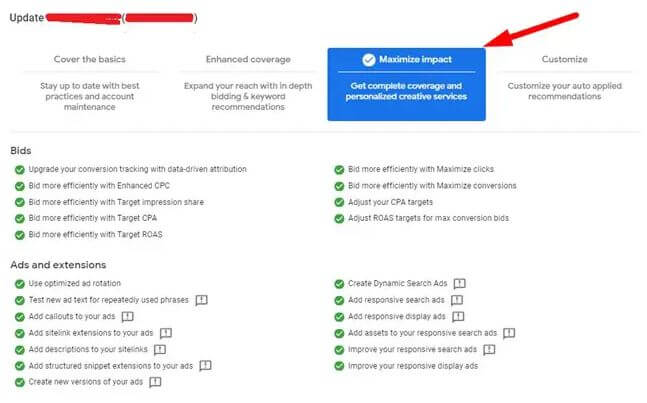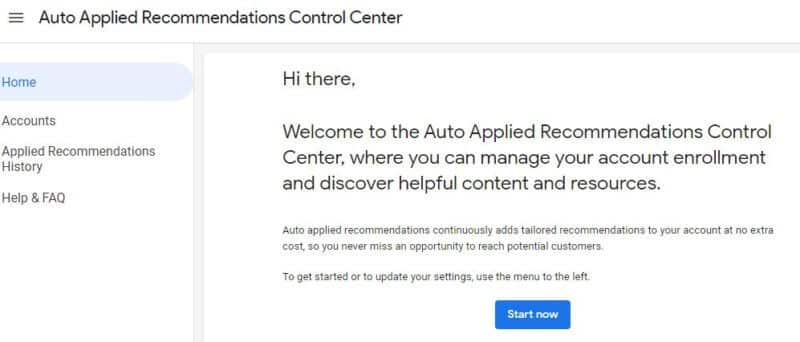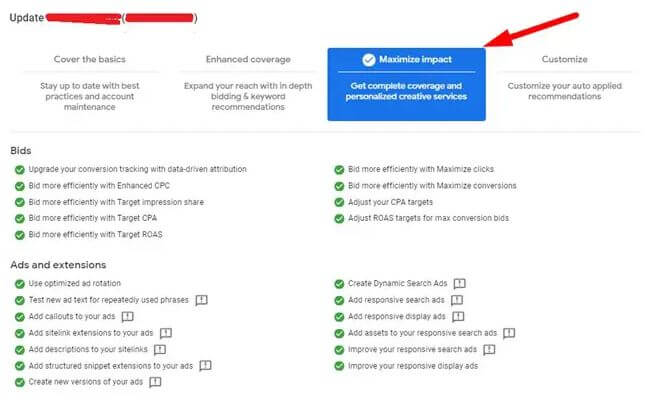In January 2019, Google notified advertisers and agencies about a new program in which Google Ads would automatically make changes in ad accounts — unless the advertisers opted-out of the pilot program. It caused a big stir, but then nothing much seemed to happen.
Then on Friday, I heard from Lior Krolewicz of Yael Consulting who said he made a concerning discovery in an account. Noticing a client’s campaign overspending, last week, he dug in and found keywords that he did not recognize. Further, there was no record of the keywords being added in the campaign’s Change History, Krolewicz wrote in a blog post Monday.
Auto Applied Recommendations. A Google Ads rep directed him to the Auto Applied Recommendations Control Center. This is where we come back to the program announced last year. It turns out, Krolewicz’ client account was opted into the “Maximum impact” setting in this program. The screenshot below shows just some of the options that were selected:

In one example, Google added the keyword “+taxes com” in a campaign for “tax preparation.”
“Since every keyword I added contains the root words “tax” and “preparation,” this keyword stuck out quickly,” Krolewicz said. The keywords were “overspending by 50% of my target budget,” he said. Turned out the client had opted into the beta but wasn’t fully aware of what it did, Krowlewicz explained on Twitter. In another account, Google said the keywords were added by a Google rep that neither Krolewicz nor the client has heard of. Google is looking into it.
Separate history logs. The recommendations that get applied via this beta program do not show up in Change History in Google Ads. Instead, you’ll need to log into the separate Auto Applied Recommendations Control Center to see whether you’re opted in and what changes have been made.
Based on optimization score. The list of recommendations that can be auto-applied is lengthy — encompassing everything from ads and extensions, bids, keywords and targeting, repairs and new features. The changes are added based on an accounts’ optimization score, says Google.
Per the home page, the Auto Applied Recommendations “continuously adds tailored recommendations to your account at no extra cost, so you never miss an opportunity to reach potential customers.”

According to the FAQ page, “Based on your performance history, campaign settings, and trends across Google” the recommendations will be continually applied to:
- Optimize your ads: Improve your ads, create new ads, show your best ads most often, and organize your ads into better ad groups.
- Tailor your bids: Find the right bid strategy to meet your business goals.
- Refine your keywords: Reach more people who are interested in what you offer.
- Address repairs: Fix issues with your account and improve its overall health and performance.
Google says recommendations “will not increase account-level budgets or reallocate budgets between existing campaigns.”
When we asked Google about the program last year, a spokesperson said, “Our sales teams are always looking for ways to help customers get the best results from Google Ads. We are rolling out a pilot program that we believe will help businesses optimize their accounts. As always, we build customer feedback into the final product. Customers are in full control of the account and can accept or reject recommendations as they desire.”
Krolewicz says he’s found keywords have been auto-applied in two accounts.
Why we care. Now is the time to log into the dashboard to check the settings for your accounts. Not all accounts are eligible at this point, however, depending on country and language, past spend, policy compliance, and other factors.
There are obviously long-term implications for advertisers and agencies trying to balance control and automation while having a clear understanding of what’s happening in their accounts. Having the reporting in a separate dashboard makes that challenging.
Agencies, in particular, often feel the squeeze from Google, learning that reps contact their clients directly, for example. As Krolewicz wrote, “As agencies, we are accountable for our client’s results. But if you do not know about this Beta, and new or existing clients are Active in this Beta, it will be very difficult to be successful.”
The great promise of automation like this is that we can all spend more time on strategy and analysis and less time in the campaign weeds making lots of small changes — and our accounts perform better with a hands-off approach. Transparency and track records will be critical for Google to gain trust with programs like this.
Update: This article was updated to clarify that the client opted into the program and that changes made to a separate account are under review.
The post Google’s Auto Applied Recommendations catch advertisers, agencies off guard appeared first on Search Engine Land.
Source: IAB

